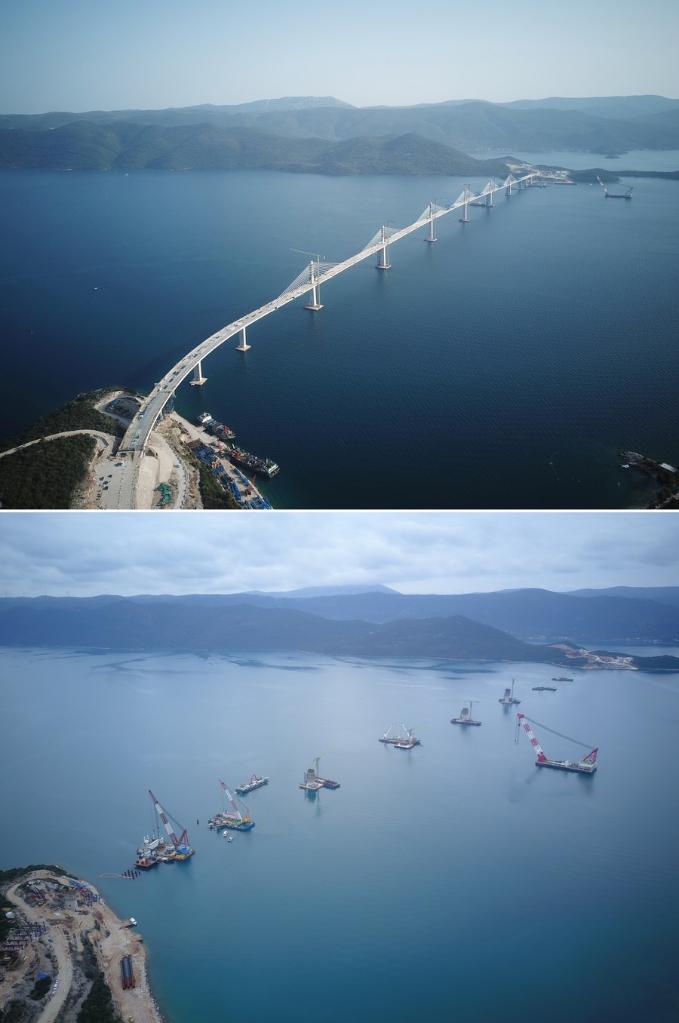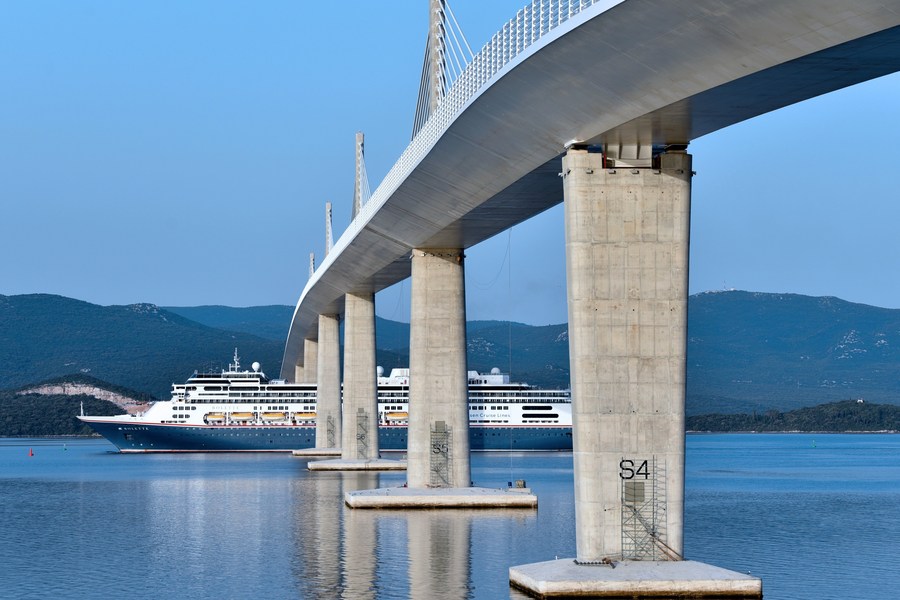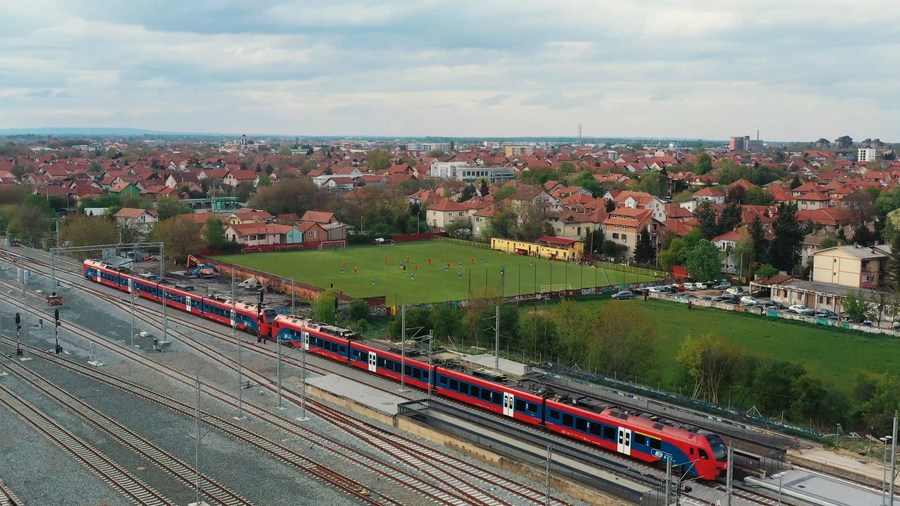* The bridge realizes "the centuries-old dream of connecting the south with the rest of Croatia" and its completion "gave the cooperation between Croatia and China a completely new dimension," Croatian Prime Minister Andrej Plenkovic told Xinhua.
* The project is also regarded as a model of tripartite cooperation among China, Croatia and the European Union (EU).
* A symbol of China's efforts to promote connectivity in Croatia and the Central and Eastern Europe countries, the bridge will not only strengthen Croatia's ties with China, but also with Europe.
KOMARNA, Croatia, July 27 (Xinhua) -- Selma Kundson remembers vividly how her deceased grandfather used to tell her about his dream that one day their home town, located on Croatia's southern Adriatic coast, would be directly connected to the rest of the country.
On Tuesday, Kundson is among hundreds of people witnessing this dream come true, thanks to the opening of the Peljesac Bridge.
Working on the bridge project for nearly four years, Kundson said she has imagined that for many years. "I will proudly tell my children and grandchildren the story of my participation in the Peljesac Bridge project as a builder," she said.
The bridge realizes "the centuries-old dream of connecting the south with the rest of Croatia" and its completion "gave the cooperation between Croatia and China a completely new dimension," Croatian Prime Minister Andrej Plenkovic told Xinhua.
Being a key project of the Belt and Road Initiative (BRI), the bridge represents a new landmark that will further brighten the prospect of China-Croatia and China-Europe relations and cooperation.

People watch a fireworks show during the inauguration ceremony of the Peljesac Bridge in Komarna, Croatia, July 26, 2022. (Xinhua/Li Xuejun)
LONG-AWAITED INTERCONNECTION
As a key infrastructure project in Croatia, the Peljesac Bridge connects the Croatian mainland with the Peljesac Peninsula of its southernmost Dubrovnik-Neretva County, bypassing a short strip of land belonging to Bosnia and Herzegovina, and giving Croatia better access to the area.
The project is also regarded as a model of tripartite cooperation among China, Croatia and the European Union (EU).
Built by a consortium led by the China Road and Bridge Corporation (CRBC), the bridge serves as an example of the China-Europe cooperation featuring complementarity and mutual benefits.
The CRBC outbid two competitors to win the contract in 2018. After three years of construction, the 2.4-km cable-stayed bridge with six pylons and steel box girders blends into the colorful landscape of the Bay of Mali Ston.
During the construction, the CRBC cooperated with 18 design consulting companies, 45 construction companies in the EU, and 112 global equipment and materials suppliers, environmental protection and other professional companies from Croatia, Romania and Poland, among others.
Praising the craftsmanship in building the bridge, Croatian President Zoran Milanovic said "The beauty of the bridge stems from the talent, knowledge, effort, and courage of the designers and builders."
"Peljesac bridge will forever remain a monumental reminder of this generation of Croatian people to reach the long-desired coast of freedom ... It was built for the benefit of all people, regardless of nation, religion, citizenship, beliefs," said the president.

Combo aerial photo shows the Peljesac Bridge after its final connection (up, taken on July 29, 2021) and during construction (down, taken on Feb. 1, 2020) at Mali Ston Bay near Komarna of southern Croatia. (Xinhua/Gao Lei)
FOR FUTURE DEVELOPMENT
For decades, local residents and tourists have been troubled by the inconvenience during border crossing through Bosnia and Herzegovina to the south Croatia.
The bridge is expected to greatly facilitate local people's trips and logistics, boost economic and social development, and improve people's well-being in Croatia.
"We are getting everything with that bridge. We are getting completed borders and access to Dubrovnik through our territory, not (via) the neighboring state," said local resident Borin Juras.
There were always long lines of cars at the border, especially during a peak tourist season, and that is about to change, local resident Milivoj Varljen told Xinhua.
"The bridge will have multiple impacts on the development of the economy and tourism in the south, but also on the whole of Croatia in the coming year," Croatian Prime Minister Plenkovic told Xinhua in a written interview prior to the opening ceremony.

A cruiser passes under the Peljesac Bridge near Komarna, Croatia, June 23, 2022. (Matko Begovic/PIXSELL via Xinhua)
The bridge not only connects the Peljesac peninsula to the Croatian mainland, but also facilitates access to the country's south, including to Dubrovnik, the crown jewel of the country's tourism. It will therefore greatly benefit tourism and trade and will reinforce the region's territorial cohesion, the prime minister said.
PLEDGE FOR SHARED FUTURE
A symbol of China's efforts to promote connectivity in Croatia and the Central and Eastern Europe countries (CEEC), the bridge will not only strengthen Croatia's ties with China, but also with Europe.
Within the framework of the China-CEEC cooperation mechanism and the BRI, Chinese companies have recently completed several key infrastructure projects in the region, including the bridge, Montenegro' first highway section and a high-speed railway in Serbia, among others.
Built by the CRBC, the 41-km priority Smokovac-Matesevo section of Montenegro's Bar-Boljare Highway was opened on July 13.
The priority section safely bypasses the Moraca canyon, an infamous transport danger zone that has seen many deadly traffic accidents over the past decades.
Snezana Culafic, a civil engineer working for the CRBC, told Xinhua that the project created "a lot of job opportunities for our engineers and employees in other fields who work on the highway," saying that the project creates new momentum in China-Montenegro relations.

Aerial photo taken on April 23, 2022 shows the Belgrade-Novi Sad section of the Belgrade-Budapest railway in Belgrade, Serbia. (Photo by Wang Wei/Xinhua)
The completion of the Bar-Boljare highway will enable rapid development of the energy industry, logistics, tourism, and other industries, and promote the economic development of Montenegro to a new level, at the same time connecting the country with Serbia and Central Europe, Ervin Ibrahimovic, deputy prime minister of Montenegro, said in a statement to Xinhua.
On March 19, Serbia inaugurated the upgraded 75-km Belgrade-Novi Sad section of a high-speed railway that will connect Belgrade and the Hungarian capital of Budapest upon completion.
Attending the ceremony with Serbia's President Aleksandar Vucic, Hungary's Prime Minister Viktor Orban said the China-built railway will help shorten travel time between Budapest and Belgrade.
"In the past 70 years, we have been connecting countries in the east-west direction, and forgotten the importance of north-south connections," Orban said. "This resulted in an appalling situation that it took too many hours to get from Belgrade to Budapest," said Orban.
For Serbian graphic designer Jastra Jelacic, the new rail link was a life-changing event, as she had to spend four or five hours each day commuting to office in Belgrade from Novi Sad for years.
Commenting on the flagship project within the China-CEEC platform, Jelacic said "I think that it is good that we are cooperating with China. I support anything that does good for our country and will lead to improvement." (Video reporters: Nemanja Cabric, Shi Zhongyu, Li Xuejun; video editors: Zhou Saang, Luo Hui, Li Qin, Liu Ruoshi, Zhang Yuhong)
